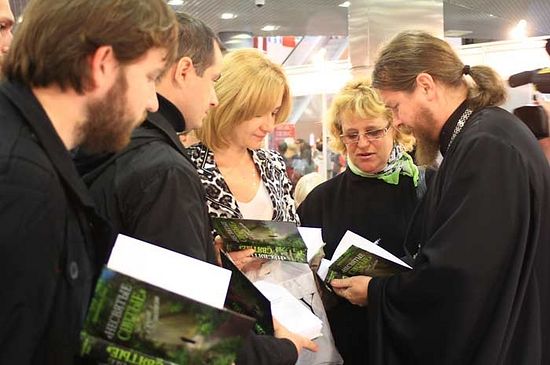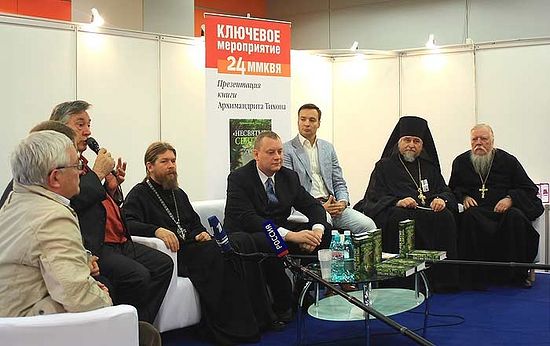 |
That this kind of literature can be read, and even more importantly, can be written, is something readers and journalists learned at the presentation of a new book by Archimandrite Tikhon (Shevkunov), the Abbot of Sretensky Monastery in Moscow. This particular presentation was one of the key events at the 24th International Moscow Book Fair and Exhibit.
Gathered to share their opinion on the subject were the well-known literary and entertainment figures, film producer Nikita Mikhailkov, writer Pavel Saneyev, and Alexander Prokhanov. Also present were I. O. Shchegelev, minister of communications and mass media of the Russian Federation, B. H. Liubimov, rector of the Shchekin Theatrical School, and a number of well-known priests of the Russian Orthodox Church, including, last but not least, Fr. Tikhon (Shevkunov), the author.
Vitaly Leontev, president of the Moscow-based publisher, "Olma Press", which published the book, when opening the presentation, noted that "There are people who read what is called "Christian literature," and there are people who say, "that kind of literature is not interesting to us, and we don't know what it is." But that is like a rejection of a part of your soul and mind. Fr. Tikhon's book has become for our publishing company a kind of "bridge," and we are trying to prove that an Orthodox Christian book can be something truly lively and close to absolutely any person." "I cannot say that if you open this book you will immediately become Orthodox. But it could fill your soul with a reflection of that light and warmth, which came down upon its heroes," he emphasized.
Oleg Tkach, the vice president of the commission for the Federal Council of informational politics and director of "Olma Media Group" noted, "On the one hand, the genre is perfectly understandable. It is spiritual literature, biographies of amazing people—people of spirit, people of faith, who lived their lives bringing light to people. But it is also a subtle, remarkable example of true Russian prose."
In his presentation he touched upon the most life-touching themes of this portion of the book fair—the "Orthodox" and "secular" sectors. "It is very important that the so-called secular publishers and book distribution networks there be spiritual literature that is understandable, accessible, which teaches faith and goodness. But at the same time, it should not frighten secular people away. It should be a bestseller that everyone could read, even those who are not Orthodox." Perhaps this point of view is shared by Olma Press; after all, Fr. Tikhon's book of stories had a print run of 60,000 copies.
Igor Shchegelov, the head of the Ministry of communications and mass media, noted that the path described in the book is "a path that is different from the path of society. Such literature opens a new perspective of life, and shows not only the problems of the human soul, but also the beauty that is within it."
Writer Alexander Prokhanov noted that the action in many of these true stories takes place in one of the spiritual centers of Russia—the Pskov-Caves Monastery. "Of course, the book brings to mind the fact that today monasteries are a concentration of a powerful and sacred aspect of Russian life and Russian fate," he added. The stories are mainly set in the tranquil Pskov province, in the Pskov Monastery of the Caves.
The format that the author uses, describing the lives of the monks of the monastery, is not rarely found in modern literature written by priests. However, by far not every author manages to maintain the necessary balance of a sense of humor with moral instruction, to find that ineffable moment of truth, when the reader understands in all clarity how God's Providence works within everyday paradoxical disorders and sorrows.
Author Pavel Sanaev touched upon this characteristic, saying, Several year ago, I began to go to church and participate in its life. Unfortunately this happened at the price of great personal misfortune. Apparently that is how we are made—unless we get hit on the head with a brick, we don't come to God, doubting until the last." "Therefore I consider that the greatest value of this book is that here you can find out what faith really is, and find food for the struggle with your own doubt. So that we wouldn't always have to come to faith through sorrows, but maybe through analysis of some facts we might find the truth. Furthermore, these are not just distant historical events, but facts gathered in our modern life," he concluded.
Archpriest Dimitry Smirnov addressed Fr. Tikhon, admitting that, "The era described in this book of reminiscences is very dear to me, and every personality is someone I know. You observed many details that I simply passed by. But as a priest, I was amazed at how the author always had the reader in mind, always made things accessible to him, and always wants to explain very important things to him in the simplest possible way. This is a missionary book," Fr. Dimitry emphasized. However, Fr. Dimitry feels that the book is also historical. "Without the Pskov-Caves monastery, religious life in Russia during the 1970s to '80s can hardly be understood. Thanks to the facts gathered in this book, we come closer to understanding it.
 |
"I consider it a great joy that there are such people among the clergy, who can go out to laypeople through a remarkable and convincing word. The ability to talk about the sacred with completely different, and not always religious people is the most thorny path to God," noted Nikita Mikhalkov at the presentation.
"I think that this book will make a large contribution to helping someone find his way to God. People are longing for this path, but can't find it amongst the weeds and grasses. They are held back by their upbringing, their surroundings, fear, the dread of feeling awkward in the presence of a priest. This book has the most important thing, in my opinion—the beginning of the path for anyone that wants to move forward into the great world of Orthodoxy," he added. "It is filled with that truth about which Federico Felini spoke: "I want to speak the truth that I don't know, but that I seek," stressed the famous film producer.
One of the most expressive comparisons of the book that could be heard at the presentation belonged to the rector of the Shchepkin Theater School, Boris Liubimov. He called in the "twenty-first century patericon." "I believe that someday, maybe even during this generation, Archimandrite John (Krestiankin) will be canonized a saint, and perhaps even the entire host of Pskov-Cave elders," stated Mr. Liubimov.
At the presentation's conclusion the author himself, Archimandrite Tikhon (Shevkunov) spoke. After thanking those gathered for their kind words, he revealed the main secret of his book.
"What is this book about? Right next to the ordinary world that everybody knows, which changes from, let's say, one political or social system to another, where more and more often terrible events become not only intrusive, but also ordinary, in which despair and horror often reign—besides this world and right next to it there is a real, other world. If we call it the world of the Church, many will not believe in those words. Because for the majority of our compatriots the word "Church" is bound up with a mass of stereotypes, at times extremely unattractive. These stereotypes reach from ecclesiastical officialness to boring obscurantism. But these are all just chance characteristics, and it reminds one of the words of Alexander Blok: "Wipe away the chance characteristics and you will see that the world is beautiful!" Everyone may enter this amazing world and everyone can feel he is a citizen, and sense God's Providence in his own destiny," said Fr. Tikhon.
"Every person who opens this world for himself will never forget it. Not only will he never forget it, but he won't be able to stop living it," the abbot stressed. "But this book is not only about great elders; it about ordinary people who lived in our own times. Nearly all history is united by one thing—God's Providence, which is the most amazing and wondrous miracle," concluded Fr. Tikhon.
Fr. Tikhon began writing these stories, as he said, two years ago. What he would often relate in his sermons, talks with the brothers, and lectures to his seminary students gradually flowed into one integrated narrative, the publication of which all religious readers in Russia have been waiting for.
* * *
The true stories of Archimandrite Tikhon (Shevkunov) are currently being translated into English, for the benefit and enjoyment of the English speaking world.
